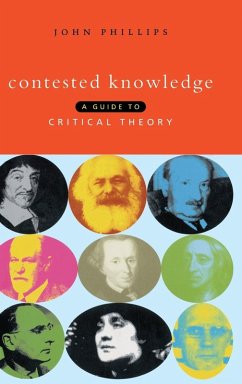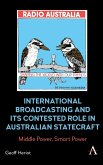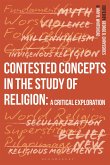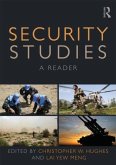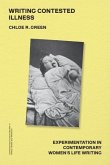- Gebundenes Buch
- Merkliste
- Auf die Merkliste
- Bewerten Bewerten
- Teilen
- Produkt teilen
- Produkterinnerung
- Produkterinnerung
This is an accessible and wide-ranging introduction to critical theory, providing a comprehensive overview of the practice, role and importance of theory across the humanities and social sciences. Key concepts and terms are explained and presented with examples and references.
Andere Kunden interessierten sich auch für
![Britain's Contested History Britain's Contested History]() Professor Bernard Porter (UK University of Newcastle)Britain's Contested History37,99 €
Professor Bernard Porter (UK University of Newcastle)Britain's Contested History37,99 €![International Broadcasting and Its Contested Role in Australian Statecraft International Broadcasting and Its Contested Role in Australian Statecraft]() Geoff HeriotInternational Broadcasting and Its Contested Role in Australian Statecraft115,99 €
Geoff HeriotInternational Broadcasting and Its Contested Role in Australian Statecraft115,99 €![Contested Concepts in the Study of Religion Contested Concepts in the Study of Religion]() Contested Concepts in the Study of Religion31,99 €
Contested Concepts in the Study of Religion31,99 €![Contested Will Contested Will]() James ShapiroContested Will21,99 €
James ShapiroContested Will21,99 €![Contested Lands Contested Lands]() T. G. FraserContested Lands22,99 €
T. G. FraserContested Lands22,99 €![Security Studies Security Studies]() Christopher Hughes (ed.)Security Studies47,99 €
Christopher Hughes (ed.)Security Studies47,99 €![Writing Contested Illness Writing Contested Illness]() Chloe R. Green (Australian National University Lecturer in EnglishWriting Contested Illness116,99 €
Chloe R. Green (Australian National University Lecturer in EnglishWriting Contested Illness116,99 €-
-
-
This is an accessible and wide-ranging introduction to critical theory, providing a comprehensive overview of the practice, role and importance of theory across the humanities and social sciences. Key concepts and terms are explained and presented with examples and references.
Produktdetails
- Produktdetails
- Verlag: Bloomsbury Publishing PLC
- Seitenzahl: 252
- Erscheinungstermin: 1. Juni 2000
- Englisch
- Abmessung: 240mm x 161mm x 19mm
- Gewicht: 516g
- ISBN-13: 9781856495578
- ISBN-10: 1856495574
- Artikelnr.: 21948563
- Herstellerkennzeichnung
- Libri GmbH
- Europaallee 1
- 36244 Bad Hersfeld
- gpsr@libri.de
- Verlag: Bloomsbury Publishing PLC
- Seitenzahl: 252
- Erscheinungstermin: 1. Juni 2000
- Englisch
- Abmessung: 240mm x 161mm x 19mm
- Gewicht: 516g
- ISBN-13: 9781856495578
- ISBN-10: 1856495574
- Artikelnr.: 21948563
- Herstellerkennzeichnung
- Libri GmbH
- Europaallee 1
- 36244 Bad Hersfeld
- gpsr@libri.de
John Phillips is a senior lecturer at the National University of Singapore.
How to Use This Book Part I: Introduction to Critical Theory 1. Critical Critical
Metaphysics
Man
Crisis
Critique
Critical Theory
Postmodernism and Critical theory 2. Representations Books and Life
Truth
In between
To be
"Is" and "Ing" 3. Theory The Empirical and the Transcendental
What theory is and why it is necessary
Object and Concept
Analogy
Economy
Objects
Summary Part II: Philosophical Impossibilities 1. The Ancients Philosophy
Deception
Socratic Dialogue
Plato's Theatre
Nous (Mind)
Allegory
Contingency
Plato's Cave
Ideal Objects
Technology
The Visible and the Invisible
Analogy
The Divided Line
The Empirical and the Transcendental 2. Greek/Jew: Closure and Opening Greek
Binary Oppositions
Empirical/Transcendental Difference
Jew
The Law
Dogmatism and Criticism
Singularity and Plurality
Opening and Closure 3. Modernity Empiricism
Rationality
Freedom
Progress
Centrism
Ethnocentrism
Androcentrism
Phonocentrism
Logocentrism
Descartes' Judgement
Otherness
infinity and difference
How to not define the other Summary Cogito Ergo Sum
Frontiers
The Subject in Crisis
Authority and Enlightenment
Architectural Metaphors
Responsibility Part III: The Political 1. Being Rhetoric
The Being of Things
Being and Beings 2. The Political 3. False Consciousness False Consciousness
Figurative Language
Graven Images
Fetish
Logocentrism
Nomos
Access to the Transcendental Part IV: Structuralism 1. Saussure What is Structuralism? Where does structuralism come from? The Course in General Linguistics
Why "general"
The Sign Signifier/Signified System and Utterance Difference' "To a Certain Extent"
System and Difference
Developments in Structuralism
How Structuralism Works
An Exercise in Structuralism
Synchrony/Diachrony
System/Process
Paradigm/Syntagm 2. Levi-Strauss Structural Linguistics and Anthropology
Necessary Laws
Kinship Relations
Second Order First
The Elementary Unit of Kinship
Uncles with Attitude
The Incest Taboo-woman as symbol of exchange
The Structural Analysis of Myth
The Algorithm of Myth 3. Jakobson Two Types of Aphasia
The Similarity Disorder
The Contiguity Disorder
Metaphor and Metonymy
The Map on the Wall Part V: Derrida and Deconstruction 1. The Text "Text"
Derrida's work
Presence and Absence
The Way We Think
Structure
Play
The way of the text
Bricoleur and Engineer
Supplementarity
Radical Empiricism
"Something Missing" 2. Difference The Same
Différance
Difference a priori
A commentary on "Differance"
What to Look for 3. Exemplification Deconstruction
Repetition and Writing
Superfluity and Writing
Alterity and Transcendence
Writing and Interpretation
Transcendental Contraband
Exemplification Part VI: Psychoanalysis 1. Freud and The Dreamwork Psychoanalysis and Critical Theory
The Unconscious since Freud
Dreams
Interpretation
The Dream Work
Condensation
Displacement
Overdetermination
Considerations of Representability
Kettle Logic 2. Lacan
Freud and Sexuality Lacan and Language
The Unconscious is the Discourse of the Other
The Unconscious is structured like a Language
Metaphor and Metonymy
Sexuality and Sexual Difference
Deferred Action
Sexuality
Oedipus
Sexual Difference
Cinema: Pleasure and Drive
The Ring 3. The Return to Melanie Klein Acquiring Knowledge
The Ruined World
Kleinian Scientificity
Armageddon
Soldier
Problems
The Knowledge Concluding Remarks
Metaphysics
Man
Crisis
Critique
Critical Theory
Postmodernism and Critical theory 2. Representations Books and Life
Truth
In between
To be
"Is" and "Ing" 3. Theory The Empirical and the Transcendental
What theory is and why it is necessary
Object and Concept
Analogy
Economy
Objects
Summary Part II: Philosophical Impossibilities 1. The Ancients Philosophy
Deception
Socratic Dialogue
Plato's Theatre
Nous (Mind)
Allegory
Contingency
Plato's Cave
Ideal Objects
Technology
The Visible and the Invisible
Analogy
The Divided Line
The Empirical and the Transcendental 2. Greek/Jew: Closure and Opening Greek
Binary Oppositions
Empirical/Transcendental Difference
Jew
The Law
Dogmatism and Criticism
Singularity and Plurality
Opening and Closure 3. Modernity Empiricism
Rationality
Freedom
Progress
Centrism
Ethnocentrism
Androcentrism
Phonocentrism
Logocentrism
Descartes' Judgement
Otherness
infinity and difference
How to not define the other Summary Cogito Ergo Sum
Frontiers
The Subject in Crisis
Authority and Enlightenment
Architectural Metaphors
Responsibility Part III: The Political 1. Being Rhetoric
The Being of Things
Being and Beings 2. The Political 3. False Consciousness False Consciousness
Figurative Language
Graven Images
Fetish
Logocentrism
Nomos
Access to the Transcendental Part IV: Structuralism 1. Saussure What is Structuralism? Where does structuralism come from? The Course in General Linguistics
Why "general"
The Sign Signifier/Signified System and Utterance Difference' "To a Certain Extent"
System and Difference
Developments in Structuralism
How Structuralism Works
An Exercise in Structuralism
Synchrony/Diachrony
System/Process
Paradigm/Syntagm 2. Levi-Strauss Structural Linguistics and Anthropology
Necessary Laws
Kinship Relations
Second Order First
The Elementary Unit of Kinship
Uncles with Attitude
The Incest Taboo-woman as symbol of exchange
The Structural Analysis of Myth
The Algorithm of Myth 3. Jakobson Two Types of Aphasia
The Similarity Disorder
The Contiguity Disorder
Metaphor and Metonymy
The Map on the Wall Part V: Derrida and Deconstruction 1. The Text "Text"
Derrida's work
Presence and Absence
The Way We Think
Structure
Play
The way of the text
Bricoleur and Engineer
Supplementarity
Radical Empiricism
"Something Missing" 2. Difference The Same
Différance
Difference a priori
A commentary on "Differance"
What to Look for 3. Exemplification Deconstruction
Repetition and Writing
Superfluity and Writing
Alterity and Transcendence
Writing and Interpretation
Transcendental Contraband
Exemplification Part VI: Psychoanalysis 1. Freud and The Dreamwork Psychoanalysis and Critical Theory
The Unconscious since Freud
Dreams
Interpretation
The Dream Work
Condensation
Displacement
Overdetermination
Considerations of Representability
Kettle Logic 2. Lacan
Freud and Sexuality Lacan and Language
The Unconscious is the Discourse of the Other
The Unconscious is structured like a Language
Metaphor and Metonymy
Sexuality and Sexual Difference
Deferred Action
Sexuality
Oedipus
Sexual Difference
Cinema: Pleasure and Drive
The Ring 3. The Return to Melanie Klein Acquiring Knowledge
The Ruined World
Kleinian Scientificity
Armageddon
Soldier
Problems
The Knowledge Concluding Remarks
How to Use This Book Part I: Introduction to Critical Theory 1. Critical Critical
Metaphysics
Man
Crisis
Critique
Critical Theory
Postmodernism and Critical theory 2. Representations Books and Life
Truth
In between
To be
"Is" and "Ing" 3. Theory The Empirical and the Transcendental
What theory is and why it is necessary
Object and Concept
Analogy
Economy
Objects
Summary Part II: Philosophical Impossibilities 1. The Ancients Philosophy
Deception
Socratic Dialogue
Plato's Theatre
Nous (Mind)
Allegory
Contingency
Plato's Cave
Ideal Objects
Technology
The Visible and the Invisible
Analogy
The Divided Line
The Empirical and the Transcendental 2. Greek/Jew: Closure and Opening Greek
Binary Oppositions
Empirical/Transcendental Difference
Jew
The Law
Dogmatism and Criticism
Singularity and Plurality
Opening and Closure 3. Modernity Empiricism
Rationality
Freedom
Progress
Centrism
Ethnocentrism
Androcentrism
Phonocentrism
Logocentrism
Descartes' Judgement
Otherness
infinity and difference
How to not define the other Summary Cogito Ergo Sum
Frontiers
The Subject in Crisis
Authority and Enlightenment
Architectural Metaphors
Responsibility Part III: The Political 1. Being Rhetoric
The Being of Things
Being and Beings 2. The Political 3. False Consciousness False Consciousness
Figurative Language
Graven Images
Fetish
Logocentrism
Nomos
Access to the Transcendental Part IV: Structuralism 1. Saussure What is Structuralism? Where does structuralism come from? The Course in General Linguistics
Why "general"
The Sign Signifier/Signified System and Utterance Difference' "To a Certain Extent"
System and Difference
Developments in Structuralism
How Structuralism Works
An Exercise in Structuralism
Synchrony/Diachrony
System/Process
Paradigm/Syntagm 2. Levi-Strauss Structural Linguistics and Anthropology
Necessary Laws
Kinship Relations
Second Order First
The Elementary Unit of Kinship
Uncles with Attitude
The Incest Taboo-woman as symbol of exchange
The Structural Analysis of Myth
The Algorithm of Myth 3. Jakobson Two Types of Aphasia
The Similarity Disorder
The Contiguity Disorder
Metaphor and Metonymy
The Map on the Wall Part V: Derrida and Deconstruction 1. The Text "Text"
Derrida's work
Presence and Absence
The Way We Think
Structure
Play
The way of the text
Bricoleur and Engineer
Supplementarity
Radical Empiricism
"Something Missing" 2. Difference The Same
Différance
Difference a priori
A commentary on "Differance"
What to Look for 3. Exemplification Deconstruction
Repetition and Writing
Superfluity and Writing
Alterity and Transcendence
Writing and Interpretation
Transcendental Contraband
Exemplification Part VI: Psychoanalysis 1. Freud and The Dreamwork Psychoanalysis and Critical Theory
The Unconscious since Freud
Dreams
Interpretation
The Dream Work
Condensation
Displacement
Overdetermination
Considerations of Representability
Kettle Logic 2. Lacan
Freud and Sexuality Lacan and Language
The Unconscious is the Discourse of the Other
The Unconscious is structured like a Language
Metaphor and Metonymy
Sexuality and Sexual Difference
Deferred Action
Sexuality
Oedipus
Sexual Difference
Cinema: Pleasure and Drive
The Ring 3. The Return to Melanie Klein Acquiring Knowledge
The Ruined World
Kleinian Scientificity
Armageddon
Soldier
Problems
The Knowledge Concluding Remarks
Metaphysics
Man
Crisis
Critique
Critical Theory
Postmodernism and Critical theory 2. Representations Books and Life
Truth
In between
To be
"Is" and "Ing" 3. Theory The Empirical and the Transcendental
What theory is and why it is necessary
Object and Concept
Analogy
Economy
Objects
Summary Part II: Philosophical Impossibilities 1. The Ancients Philosophy
Deception
Socratic Dialogue
Plato's Theatre
Nous (Mind)
Allegory
Contingency
Plato's Cave
Ideal Objects
Technology
The Visible and the Invisible
Analogy
The Divided Line
The Empirical and the Transcendental 2. Greek/Jew: Closure and Opening Greek
Binary Oppositions
Empirical/Transcendental Difference
Jew
The Law
Dogmatism and Criticism
Singularity and Plurality
Opening and Closure 3. Modernity Empiricism
Rationality
Freedom
Progress
Centrism
Ethnocentrism
Androcentrism
Phonocentrism
Logocentrism
Descartes' Judgement
Otherness
infinity and difference
How to not define the other Summary Cogito Ergo Sum
Frontiers
The Subject in Crisis
Authority and Enlightenment
Architectural Metaphors
Responsibility Part III: The Political 1. Being Rhetoric
The Being of Things
Being and Beings 2. The Political 3. False Consciousness False Consciousness
Figurative Language
Graven Images
Fetish
Logocentrism
Nomos
Access to the Transcendental Part IV: Structuralism 1. Saussure What is Structuralism? Where does structuralism come from? The Course in General Linguistics
Why "general"
The Sign Signifier/Signified System and Utterance Difference' "To a Certain Extent"
System and Difference
Developments in Structuralism
How Structuralism Works
An Exercise in Structuralism
Synchrony/Diachrony
System/Process
Paradigm/Syntagm 2. Levi-Strauss Structural Linguistics and Anthropology
Necessary Laws
Kinship Relations
Second Order First
The Elementary Unit of Kinship
Uncles with Attitude
The Incest Taboo-woman as symbol of exchange
The Structural Analysis of Myth
The Algorithm of Myth 3. Jakobson Two Types of Aphasia
The Similarity Disorder
The Contiguity Disorder
Metaphor and Metonymy
The Map on the Wall Part V: Derrida and Deconstruction 1. The Text "Text"
Derrida's work
Presence and Absence
The Way We Think
Structure
Play
The way of the text
Bricoleur and Engineer
Supplementarity
Radical Empiricism
"Something Missing" 2. Difference The Same
Différance
Difference a priori
A commentary on "Differance"
What to Look for 3. Exemplification Deconstruction
Repetition and Writing
Superfluity and Writing
Alterity and Transcendence
Writing and Interpretation
Transcendental Contraband
Exemplification Part VI: Psychoanalysis 1. Freud and The Dreamwork Psychoanalysis and Critical Theory
The Unconscious since Freud
Dreams
Interpretation
The Dream Work
Condensation
Displacement
Overdetermination
Considerations of Representability
Kettle Logic 2. Lacan
Freud and Sexuality Lacan and Language
The Unconscious is the Discourse of the Other
The Unconscious is structured like a Language
Metaphor and Metonymy
Sexuality and Sexual Difference
Deferred Action
Sexuality
Oedipus
Sexual Difference
Cinema: Pleasure and Drive
The Ring 3. The Return to Melanie Klein Acquiring Knowledge
The Ruined World
Kleinian Scientificity
Armageddon
Soldier
Problems
The Knowledge Concluding Remarks

